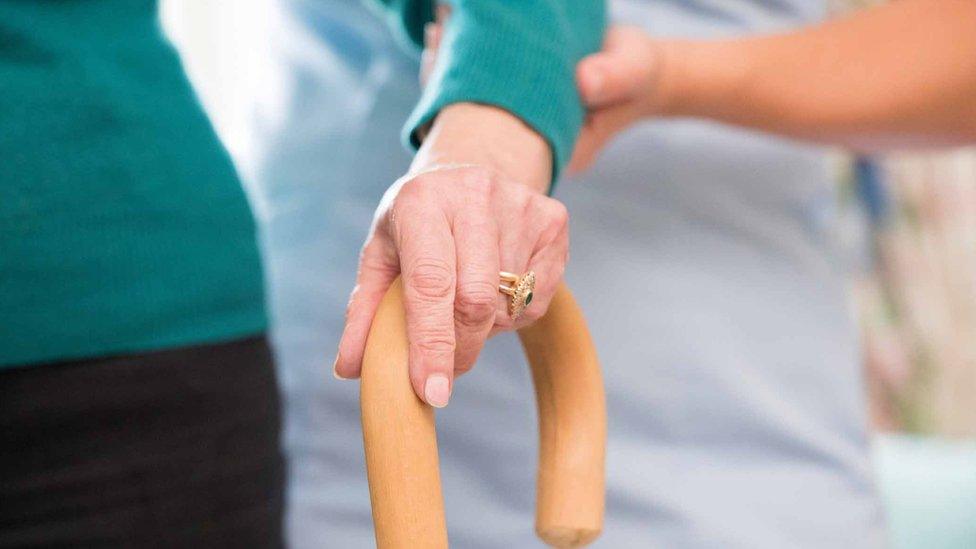Coronavirus: Care home moves had 'tragic consequences'
- Published

There were "tragic consequences" of moving patients from hospitals to care homes at the start of the coronavirus pandemic, care chiefs in England say.
An Association of Directors of Adult Social Services report says a lack of testing in England may have sped up the spread of coronavirus in care settings.
ADASS also said the impact of Covid-19 meant many care providers faced financial problems.
The government said funding was being put in to local care services.
An extra £3.8 billion has also been provided to councils to fund social care, it added.
The ADASS report on the impact of the pandemic on care services is based on a survey of 146 out of the 151 directors of social care in English councils.
They point to the problems caused by the rapid discharge of patients from hospitals into care homes in the first weeks of the pandemic.
More than half of directors believe people were not tested before being discharged. They also raise concerns about a lack of checks on whether the homes people were going to had enough personal protective equipment (PPE).
James Bullion, president of ADASS, said: "Just assuming the homes could cope, and assuming that homes had the PPE to cope, wasn't the right thing to do.
"And that tells us that social care was an afterthought rather than a forethought of a whole system approach to discharge and that has had terrible consequences."
He said it was right to try to move people out of hospital at that time.
But he added: "It is absolutely crucial that we learn the lesson that you can't think about the health service without thinking about social care."

Wren Hall nursing home in Nottinghamshire has seen 16 of its residents die with Covid-19.
It saw its first case on March 24, but managers do not know how the virus got into the home.
Wren Hall did take people discharged from hospital. Most had been tested, but sometimes that was days before they were transferred.
Anita Astle, the home's managing director says it has been a deeply distressing time, emotionally and financially.
"The first thing is losing people we cared about and didn't expect to lose. Our staff teams were grieving, but at the same time we were aware that we needed to fill beds for for financial viability and job security.
"We did feel under pressure to take people from hospital, whether or not they were Covid positive, because we needed to keep the business going."
But she said that, if there is a second wave of coronavirus, care homes would make very different decisions.
"We won't be taking positive people from hospital. We will be consulting our staff team and families of those we're supporting and we'll create a plan that meets those people's requests and expectations."

Before the pandemic most directors said they were concerned about the financial viability of some of the care providers in their area.
Now with the extra costs of PPE, staffing and with care home vacancies resulting from the pandemic, a quarter say they are worried about the ability of most of the companies in their area to survive.
And 7% say they are worried about the sustainability of all local care providers.
They are calling for the government to provide more funding to help stabilise the care system.
A Department of Health and Social Care spokesman said: "Adult social care will continue to get all the support and resources they need to tackle the impacts of the pandemic, with £3.2bn for local authorities to help address pressures on local services, including in in adult social care, and £600m to control infections in care homes."

RISK AT WORK: How exposed is your job?
SCHOOLS: When will children be returning?
THE R NUMBER: What it means and why it matters
LOOK-UP TOOL: How many cases in your area?
GLOBAL SPREAD: Tracking the pandemic
